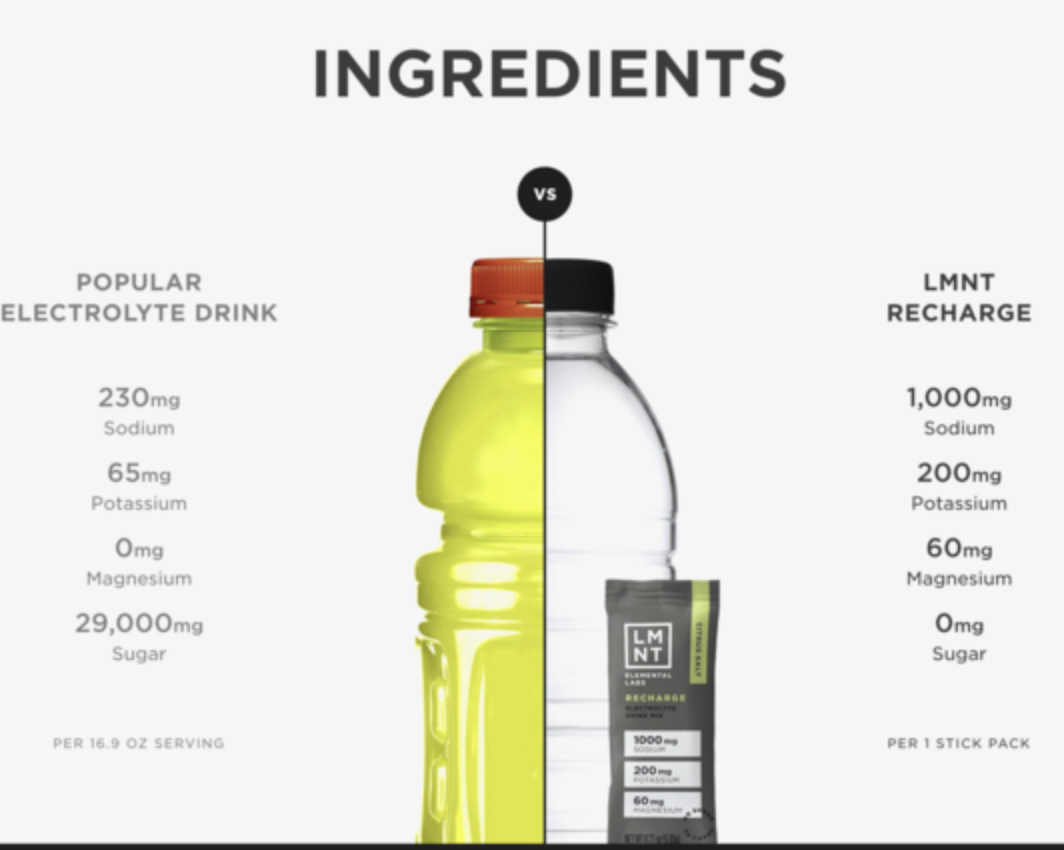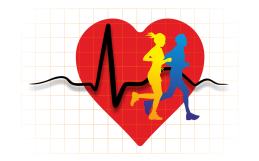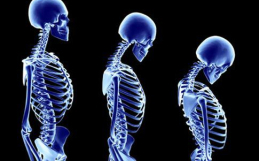I have been looking for an electrolyte replacement that is not full of sugar, food colourings, various (difficult to pronounce) chemicals and additives for many years now. Healthy hydration equals water plus electrolytes. Electrolytes are minerals—sodium, chloride, potassium, magnesium, calcium, phosphorus, and bicarbonate—that carry electrical charges in your body. This electricity conduction allows cells to communicate, including brain cells.
When you’re well-hydrated, your body can function at an optimal level. Most of your body systems depends on you being hydrated. When you’re dehydrated, it affects your mood and mental health. Symptoms might include irritability or depression. Productivity is another link between your job and hydration. If you aren’t hydrated, you may have brain fog or problems thinking clearly. That can lead to diminished productivity.
As you may know, I am huge advocate of various forms of physical activity for myself, my family and the patients I see in the office. This physical activity results in sweating and losing electrolytes and potentially becoming dehydrated. I am also an avid fan of heat stress via the sauna and I attempt to perform this daily as part of my morning routine. (Have look at this link to review the research on how heat stress improves healthspan). Sauna use also involves significant sweating.
Up until the pandemic, I would often travel/fly every quarter to conferences and as you may know, flying results in significant dehydration. Recently, I began consuming LMNT electrolyte mix and playing with all the different flavours. They are branded as a ‘tasty zero-sugar electrolyte drink, with everything you need and nothing you don’t’. I have now added it to my nutritional/exercise routine. Also, this is a much better option than the other common sports drinks for my kids to during all their sports and physical activities.
Thanks to grassrootsfunctionalmedicine.com for image below:

Why do I need an electrolyte replacement?
Let me provide a bit of context with a bit of the backstory on how and why I became interested in hydration and electrolyte replacement. Over the last ten to fifteen years, I have been conducting many experiments on myself with various forms of lifestyle changes. One example, was putting myself into a state of ketosis using a ketogenic or ‘keto’ diet for several years. A well-formulated ketogenic diet is often confused with eating copious amounts of butter and bacon. While I was on this diet, I would include a very large bowl of salad with a generous amount of healthy fats including olive oil, MCT oil, avocado, along with seeds and nuts. For most of us, being in a ketogenic state allows your body to burn fats very efficiently and improve your body’s (metabolic) flexibility in utilizing carbohydrates or carbs and fats. We become ‘fat-adapted’ which means our bodies can tap into relatively limitless amounts of body fat. From an ancestral standpoint when food was not as plentiful this allowed our species to survive during lean times. One of the things that occur when you substantially lower your carb (sugar, breads, grains, etc.) is your insulin levels remain low. This is beneficial for many conditions. But this also causes the kidneys to excrete more sodium and can also impact the balance of other key electrolytes in the body.
According to Virtahealth’s (defining characteristic #3 of a well-forrmulated ketogenic diet):
Defining Characteristic #3: A WFKD contains enough electrolytes and intercellular minerals to maintain optimum circulatory, muscle, and nerve functions.
- Adequate sodium and potassium are provided to support circulatory volume and avoid potassium depletion resulting in impaired muscle anabolism or adrenal stress.
- Accelerated renal sodium excretion associated with nutritional ketosis raises the typical adult daily sodium intake requirement to 4–5 g/d with exceptions for those taking medications for hypertension or congestive heart failure.
- Magnesium depletion signs/symptoms such as muscle cramps, muscle fasciculations, and persistent hypokalemia are common in adults due to poor dietary intake combined with medication and/or alcohol effects on renal excretion.
- Magnesium intake often needs to be increased by food choices or supplementation to normalize neuromuscular and cardiac functions as well as lean body mass preservation independent of dietary protein adequacy.
(Watch this for a little review on why we need to supplement with magnesium. Magnesium video.)
What are the main reasons we lose electrolytes on low carb, keto or paleo-type diets?
- Carbs are stored along with water in the body
- Eating less carbs= getting rid of more water and keeping less water in the body
- Less carbs=less insulin=kidney get rid of more sodium
- Less sodium effects the balance of other important electrolytes
- Results in the ‘keto flu’. These symptoms are primarily caused by loss of sodium, magnesium and potassium.
The most important role of electrolytes is to maintain hydration and acidity levels in the body as well as maintain muscle and nerve function.
Learning all this (mainly through trial and error as keto was not very popular 10 plus years ago) I started to add various electrolytes to my hydration plan and began to feel and perform better.
As I have written previously, I was getting away from all sugar and chemical-laden sports drinks. Sports drinks with electrolytes, may be useful for people doing high intensity, vigorous exercise in very hot weather, though they tend to be high in added sugars, dyes and calories.
What are the ways we lose water?
Sweat – In order to keep the body in balance with temperature, the body releases sweat to cool us down. This is the primary strategy the body will use to regulate our rising temperature. Any time we sweat we lose water (99% of sweat is water) through our skin along with minerals and urea. Very similar to the composition of urine. Although the mineral content varies, some measured concentrations are (in decreasing order): sodium, potassium, calcium and magnesium
Breathing- when we exhale (made up of carbon dioxide and water) we lose water. The more active we are and the drier the conditions, the more water we lose and the amount can be significant over time. Flying in an airplane’s dry conditions can significantly increase how much water you lose and dehydration
A higher heart rate than normal is one clue that dehydration might be going on
Urine – The mineral sodium is used in every cell of your body. It’s especially important for the function of your nerves and muscles. Hormones tell the kidney when to hold sodium in the body instead of passing it in the urine (as long as the kidneys are functioning properly)
The most common way that water leaves our system is through urine and the kidney conduct most of the filtration and excretion of water.
Diuretics- these are chemicals that make you pee more than you need to pee by increasing your production of urine. These include natural diuretics like caffeine and alcohol.
I have been following Peter Attia’s work on longevity for many years now. He is partly to blame for me questioning many of the common things we are taught regarding optimal nutrition, cholesterol, exercise, etc. His “Who am I” reads:
“I am a physician focusing on the applied science of longevity. My practice deals extensively with nutritional interventions, exercise physiology, sleep physiology, emotional and mental health, and pharmacology to increase lifespan (delay the onset of chronic disease), while simultaneously improving healthspan (quality of life).”
Peter recently lost consciousness and fell and hit his head on a table. He attributes this incident to him being profoundly dehydrated. Following this he did a podcast on Hydration—electrolytes, supplements, sports drinks, performance effects, and more. https://peterattiamd.com/ama33/
“Anytime I’m not drinking [plain] water, there’s really a purpose that I’m trying to serve in terms of glucose and/or electrolyte replacement and improving hydration status and water absorption.” —Peter Attia
(Following this podcast, Peter became an investor in LMNT.) https://peterattiamd.com/ama33/
Here are some frequently asked questions from LMNT website:
Can I make my own electrolyte drink mix at home with LMNT ratios?
Of course! Here’s how to make a “Raw Unflavored” base:
½ teaspoon salt (provides ~1 g sodium)
500 mg potassium citrate powder (provides ~200 mg potassium)
¼ teaspoon of magnesium malate (provides ~60 mg magnesium)
For more homemade electrolyte recipes, check out The Best Homemade Electrolyte Drink for Dehydration (All Natural Ingredients)
What are the ingredients in LMNT?
You can find a full list of ingredients and nutrition facts panels for every flavor of LMNT by visiting our webstore and scrolling through the product images.
Raw Unflavored: Salt (Sodium Chloride), Magnesium Malate, Potassium Chloride.
Orange Salt: Salt (Sodium Chloride), Citric Acid, Magnesium Malate, Potassium Chloride, Natural Flavors, Stevia Leaf Extract.
Citrus Salt: Salt (Sodium Chloride), Citric Acid, Magnesium Malate, Potassium Chloride, Natural Flavors, Stevia Leaf Extract.
Raspberry Salt: Salt (Sodium Chloride), Citric Acid, Magnesium Malate, Potassium Chloride, Natural Flavors, Stevia Leaf Extract.
Watermelon Salt: Salt (Sodium Chloride), Malic Acid, Magnesium Malate, Potassium Chloride, Natural Watermelon Flavor, Stevia Leaf Extract.
Mango Chili: Salt (Sodium Chloride), Malic Acid, Magnesium Malate, Potassium Chloride, Natural Mango Flavor, Natural Chili Flavor, Stevia Leaf Extract.
Lemon Habanero: Salt (Sodium Chloride), Citric Acid, Magnesium Malate, Potassium Chloride, Natural Lemon Flavor, Natural Habanero Flavor, Stevia Leaf Extract.
Chocolate Salt: Salt (Sodium Chloride), Cocoa Powder, Magnesium Malate, Potassium Chloride, Natural Chocolate Flavor, Stevia Leaf Extract.
How is LMNT different from other electrolyte brands?
It’s simple: LMNT is a zero-sugar electrolyte drink mix, with everything you need and nothing you don’t. Our ratio stands out: LMNT delivers a truly meaningful dose of electrolytes without the sugar, junky fillers, or artificial coloring found in other “sports drinks.”
When should I drink LMNT?
LMNT is great to use in a variety of situations – we receive feedback across quite a broad spectrum in that regard.
So here’s the short answer: The most common usage is first thing in the morning, and about 30 mins prior to a workout, high-intensity activity, or when mental clarity is at a premium. A good thing to remember is when it comes to replacing lost electrolytes–preparing ahead of time is much better than chasing them afterward.
We certainly encourage folks to test out what works best for them, and to let us know–we are always eager for feedback!
Can LMNT improve milk supply?
Many moms have reported that LMNT (our salty electrolyte drink mix) has helped them produce more. These reports make sense given the importance of sodium in the formation of breast milk. Electrolytes are certainly not the only way moms can increase their milk supply, but they’re definitely an interesting piece of the puzzle.
Sodium is an essential mineral during both pregnancy and breastfeeding. When pregnant women don’t get enough salt, the consequences to the fetus can include:
- Low birth weight
- Delayed growth
- Shrinking of the cardiovascular system
- Impaired kidney function
- Intrauterine death
It makes me (author from Team LMNT not Dr Dan) sad and angry that so many sources continue to recommend salt restriction during pregnancy. The claim is that less dietary sodium prevents a high-blood pressure pregnancy complication called preeclampsia, but according to a review of the scientific literature, this just isn’t true.
After birth, sodium continues to matter. One study, for instance, found that premature babies who consumed more sodium had better IQs, motor function, and memory than their lower sodium counterparts.
(Back to Dr Dan here) As a result of listening to several podcasts and a few anecdotal reports from patients that sodium increases milk supply, I started serving up pinches of sea salt in water for my wife when she was feeding the twins. Interestingly, she did not have any issues with milk supply.
In health,
Dr Dan.
LMNT_PRODUCT_BROCHURE_ALLFLAVORS












